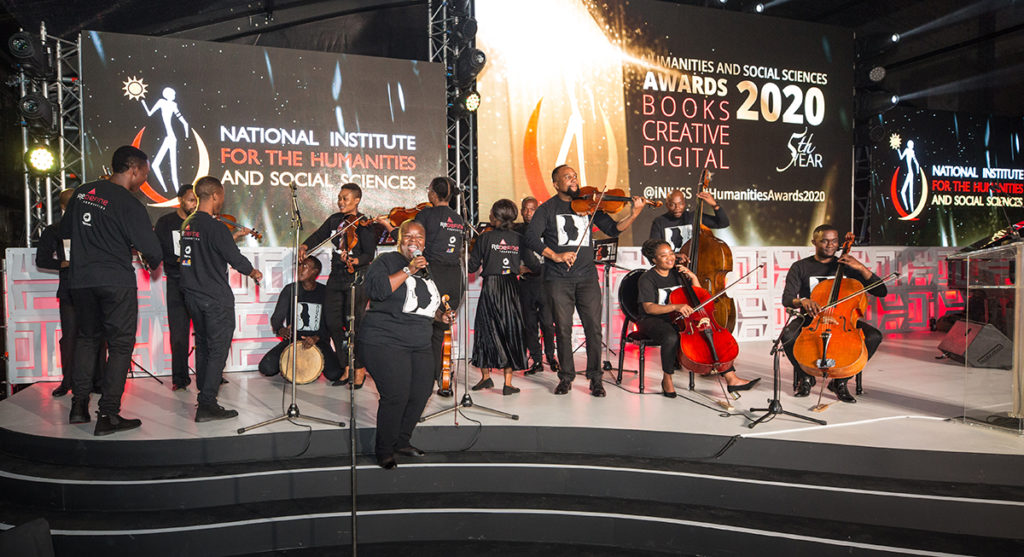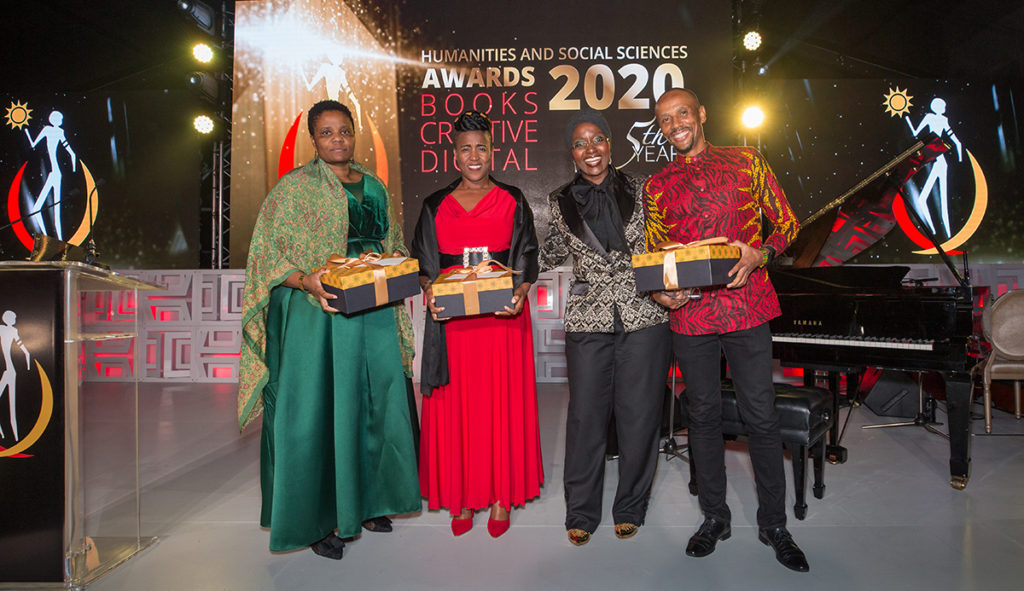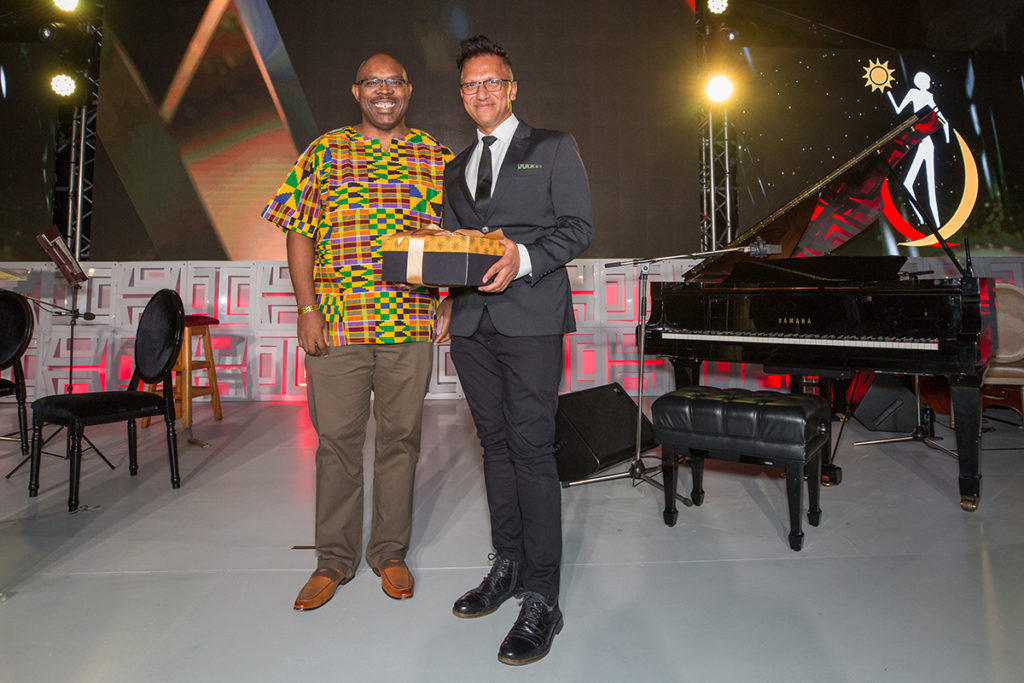The fifth installation of the Humanities Awards 2020, held on March 12 2020 and hosted by the NIHSS took place at Constitution Hill Human Rights Precinct, Parktown, Johannesburg. Here the winning HSS scholars and the judging panel flank NIHSS chief executive, Professor Sarah Mosoetsa, and Deputy Minister of Higher Education, Science and Technology, Buti Manamela. (Courtesy of NIHSS)
SPONSORED
The focus of the humanities and social sciences is to create a plethora of data and knowledge that provides insight on human behaviour and interaction, to form a comprehensive understanding of personal experiences and how they are interwoven to produce the global context. The fifth installation of the Humanities and Social Sciences (HSS) Awards, held on March 12 2020, is a platform that promotes the creation and preservation of data, knowledge, and knowledge systems in a manner that ensures the humanities and social sciences thrive.
Professor Sarah Mosoetsa, chief executive of the National Institute for the Humanities and Social Sciences (NIHSS), said: “The essence of the awards is in recognising and promoting fresh voices that are bold and original in the way they interrogate society, covering issues of race, gender, justice, morality, freedom, history and transformation.
“It is pleasing to note that as we celebrate the golden fifth edition of the Humanities Awards 2020, we take cognisance and great delight in the increased popularity that this initiative is enjoying, given the course of its short but growing lifespan.”
The annual Humanities Awards celebrate the best work of creators and scholars from diverse backgrounds in HSS, and form part of a network of events and programmes that highlight the strides made and the needs and challenges of HSS disciplines. “These five years have most importantly provided an opportunity to self-reflect as an entity as we consider the impact we have made in dynamising the humanities — and to chart a course for the future,” said Mosoetsa.
 The Buskaid Soweto String Ensemble kept guests entertained at the HSS Awards 2020. (Courtesy of NIHSS)
The Buskaid Soweto String Ensemble kept guests entertained at the HSS Awards 2020. (Courtesy of NIHSS)
Winning an HSS award is a wonderful achievement for the recipients and one of which to be exceptionally proud. But for the Institute, recognising achievement is part of an ongoing process, one that continues long after the lights have dimmed and the applause has faded.
Most prominent in guiding the higher education landscape and voices in HSS are nonfiction, and it is fitting that the largest body of entries for this year’s Awards are in this reflective category, examining facts and information about the world around us.
Influencing new knowledge and new knowledge systems in HSS
The nonfiction category traditionally includes the Best Edited Volume and Best Monograph, and, for the first time since the inception of the Awards, this year also showcased the Best Biography Award. This large contribution of nonfiction entries equips the continent for providing both the human resources and innovative ideas needed to positively influence the creation of livelihoods, employment, equality improvement and poverty alleviation. The chair of the nonfiction jury and the presenter of the winners, Professor Hlonipha Mokoena, remarked: “Many of this year’s entries dealt with [an] unalterable link between humankind and ecology, [giving nature the] centre stage as authors worked though our anthropocentric dilemmas.”
In the Best Biography Category a joint award was presented to A political biography of Selby Msimang Principle and Pragmatism in the Liberation Struggle by Sibongiseni Mkhize and Sol Plaatje: A life of Solomon Tshekisho Plaatje 1876-1932 by Brian Willan. Willan writes about Plaatje’s life and career, and the political and social changes that took place in South Africa during Plaatjie’s time. Mkhize wrote the first comprehensive political biography of Msimang “that offers a multi-layered story of pragmatism, contradictions and ideas”. Both biographies are based on men who contributed to the literary scene during their lifetime and were pioneers during the South African struggle for democracy. The writers shed more light on the lives of these forerunners, details of who they were and what they were like in the context of their own time as opposed how we would like to see them now. The modern view of these political heroes may unnecessarily romanticise their experiences; however, both books provide well-researched, objective information on the pioneers’ lives and their written work and simultaneously provide a new perspective on the historical background to the ongoing discourse on decolonialisation.
The winning monograph, Dance of the Dung Beetles by Marcus Byrne and Helen Lunn, marries Byrne’s scientific discipline to Lunn’s social sciences and humanities. Describing the history of evolution from the dung beetle’s perspective, Lunn and Byrne transport the reader from the 21st century to the early days of global exploration and dissect themes of religion, mythology, western science, genetic changes in the environment and beings that live in it. A celebration of the dung beetle family and the many vital ecological services it performs, this collective effort within two disciplines is a literary demonstration of how ground-breaking collaborations can be achieved.
Among the finalists for this subcategory were: Civilising Grass: The art of the lawn on the South African Highveld by Jonathan Cane and Writing the Ancestral River: A biography of the Kowie by Jacklyn Cock, from Wits University Press.
 Black Academic Voices – The South African Experience”, by Grace Khunou, Hugo Canham, Katijah Khoza-Shangase and Edith Dinong Phaswana, was the deserving winner for the Best Non-Fiction: Edited Volume Award. (Courtesy of NIHSS)
Black Academic Voices – The South African Experience”, by Grace Khunou, Hugo Canham, Katijah Khoza-Shangase and Edith Dinong Phaswana, was the deserving winner for the Best Non-Fiction: Edited Volume Award. (Courtesy of NIHSS)
Presenting a biographical narration of their experiences as practitioners at higher education institutions in South Africa saw Black Academic Voices – The South African Experience, by Grace Khunou, Hugo Canham, Katijah Khoza-Shangase and Edith Dinong Phaswana claim the winning prize for Best Edited Volume. Their combined narrative explains some of the overt and covert reasons that contribute to black people — black women specifically — leaving academia. The panel of judges for this category expressed a desire for the book to be a “compulsory read for administrators and academics, especially at historically white universities”. For the authors, the selection of their work as the winning book signifies that the time for black female participation in academia is now and that black female academic voices are being heard. In a country composed of more than 70% black Africans and an approximately 50% women, Black Academic Voices provides great insight into the racial and gender skew of representation in higher education institutions.
Contending finalists in this category included Whose History Counts: Decolonializing African Pre-colonial Histography by June Bam, Lungisile Ntsebeza and Allan Zinn. Whose History Counts encompasses the knowledge production processes at higher education institutions. Challenging “the epistemic and structural decolonialisation of knowledge in South Africa”, the authors confront the idea of pre-colonial history and the methodology employed to capture and write about pre-colonial knowledge and experiences. The student protests of 2015 and those from earlier this year in KwaZulu-Natal are demonstrations of the relevance of this literary contribution. Acts of Transgression – Contemporary live art in South Africa by Jay Pather and Catherine Boulle and Transforming Research Methods in the Social Sciences: Case studies from South Africa edited by Sumaya Laher, Angelo Fynn and Sherianne Kramer, were also great contenders within this subcategory.
Hlonipha lamented that the nonfiction submissions this year reveal that “South African intellectuals are as conscious of their predecessors as they are of the present academic milieu. [They also] broaden our understanding of what it means to be an intellectual, an activist and a novelist [while offering] riveting and compelling reading”. She highlighted that the winning works are not about the individuals but also about “the collective teamwork that makes intellectual dreamwork possible”.
Changing the landscape of South African fiction
Fiona Snyckers’s Lacuna was the winning title in the Best Novel category. Its subject and plot are rooted in being a work of fiction, whose content and context are a response to nonfictional book by JM Coetzee titled Disgrace. The book is based on Capetonian Lucy’s survival of rape, whose life — like many survivors of rape — is a kaleidoscope of Post-Traumatic Stress Disorder. In Snyckers’s novel, JM Coetzee takes it upon himself to tell the story of Lucy’s rape, which propels Lucy out of her celibate lifestyle of isolation to confront Coetzee. The genius of the book is in the duality of reality and fiction as it moulds the content and context of Lucy’s life, while addressing some of the most pertinent aspects of gender-based violence.
Included in the finalists for the Best Fiction Novel was A Tree for the Birds by Vernon Head and Called to Song by Kharnita Mohamed. This category was chaired by Professor Nhlanhla Maake, who said: “The judges brought to bear on their judgement a strong inductive critique of the individual works, and a deductive critique in the broader context of theoretical paradigms of literary tradition and canon in general, and South African literature per se.” The common themes covered were noted to have historical, present and future implications that inspire reflection.
Mohamed was praised for exploring the dynamics of the coloured Muslim community in the Cape Flats in a way hasn’t been explored before in mainstream literature, and exploring the unique race and gender dynamics that are only visible from a relationship perspective. A Tree for the Birds takes on the underappreciated style of “nature writing,” where Head explores globalised greed and death in the tropical Congo through the eyes of nature enthusiast Chrisnelt, amid the international concerns and conversations on the climate crisis. The book was described as “a love letter to mother nature [that] is necessary, urgent and beautiful”.
The award for Best Fiction – Poetry and Short Stories was bestowed upon Gabeba Baderoon’s collection of poems, The History of Intimacy. The award-winning writer’s fourth collection explores modern and relevant social issues; the collection deserves praise for the exploration of personal, local, and national issues and challenges. Kogelbaai, Hangklip, Ghost Technologies, and Promised Land are among the most memorable renderings of Gabeba’s writing.
Celebrating diverse and innovative creative and digital contributions
Not to be outdone were the creative and digital humanities contributions. Chaired by Dr Andile Khumalo, this subcategory recognised the following genres: Best Musical Composition, Best Public Performance, Best Visual Art and Best Digital Humanities (DH) Visualisation or Infographic.
Notable entries for the Best Musical Composition Award were: Liminal by Reza Khota, Songs of Greeting, Healing and Heritage by Mantombi Matotiyana and facilitated by Michael Blake, as well as There’s no Disappointment in Heaven by Kgomotso Moshugi. Prior to the announcement of the winners, Khumalo lamented the difficulty in choosing the winners in each of the subcategories because of “the extraordinary quality of all the works submitted [which] is a testament to the recognition and value of the NIHSS in [the] respective fields, which include music, fine arts, digital arts, performance and curation”. He expressed a strong conviction from the jury that the “winning works had a significant contribution to contemporary South Africa and will influence the [development of art] in [many ways] in the future”.
The winning composition by Matotiyana is a project dedicated to preserving the bow song tradition from the Eastern Cape as well as Mantombi’s contribution to this genre. The composition takes on the traditional formula of creating indigenous music with a single instrument, with Mantombi’s voice adding vibrant character. The album is a product of Stellenbosch University’s Africa Open Institute for Music, Research and Innovation.
The finalists for the Best Public Performance Award include Yet to be Determined created and performed by Gavin Krastin, The Tree Song, and Institute for Creative Arts (ICA) Live Arts Festival 2018. The Tree Song, by Kristina Helena Johnstone, is a nonverbal dance performance geared towards creating a multi-modal learning model for children aged between two and four years old who have hearing impairments. Krastin’s work was supported by Rhodes University’s Department of Drama and the First Physical Theatre Company, and is a deep meditation on the nature of change and the role of mankind in the ever-changing conditions; it also explores the sensitivity and vulnerability induced by change.
 Best Public Performance winner – Institute for Creative Arts (ICA) Live Arts Festival 2018, curated by Jay Pather (right), with Creative Collections and Digital Humanities Chair Judge, Dr Andile Khumalo (left). (Courtesy of NIHSS)
Best Public Performance winner – Institute for Creative Arts (ICA) Live Arts Festival 2018, curated by Jay Pather (right), with Creative Collections and Digital Humanities Chair Judge, Dr Andile Khumalo (left). (Courtesy of NIHSS)
The Award for Best Public Performance was taken by Institute for Creative Arts (ICA) Live Arts Festival 2018, curated by Jay Pather. The performance featured over 50 artists from seven countries across the globe. The festival, which was designed as a platform for performance artists to showcase their skills, took place in the Western Cape over 16 days. The 2018 iteration attracted more than 2 000 viewers, which was the best attendance the festival had seen.
The selection of finalists for the best DH visualisation included: The Chronicles of Sketch and Etha by Gregory Koole, the Oxford Digital Thematic Atlas series, and Azimuth: An Experiment of Virtual Reality for the Fashion Film Genre by Nirma Dolly Madhoo. The winner Azimuth is a product of Madhoo’s career as a fashion filmmaker. Her work is a collaborative output informed by an awareness of the politics of representation, which explores transformation and recognises how fashion influences the lens through which bodies are viewed and identity is formed.
The Best Visual Art Award was introduced to the HSS Awards in 2017 and may be considered among those that would not be ordinarily associated with HSS but resonates with the Institution’s commitment to “encourage literary and creative expression by people not usually associated with HSS”. Contenders for the Best Visual Art award were Speaking Through Walls by Sethembile Nsezane and Nduka Mntambo’s Asymmetries, which was the winner. Asymmetries is a creative submission for Mntambo’s PhD research project and “functions as a series of experiments and explorations of the relationship between cinema and the city, through cartographic propositions stemming from theories of the Global South. [The exhibition] offers sketches explored through various practices; these practices contest normative and often oft-canonized registers for conceptualizing and visualising African urbanity”.
A journey through the five years
“Quite a number of the works and winners recognised at the annual HSS Awards have gone on to extend their influence and impact in enduring ways. Much of the content of our award-winning books is suitable for incorporation into higher education curricula and has indeed been used in this way. Many of the authors, playwrights, performing and creative artists recognised at these awards since 2016 have gone on to produce other ground-breaking work, garnering recognition across Africa and internationally,” said Mosoetsa.
Who could forget Jacob Dlamini, author of the seminal work Askari: A Story of Collaboration and Betrayal in the Apartheid Struggle, who won the 2016 award for best monograph? What about the tragic, poignant, riveting account of black South African soldiers aboard the ill-fated World War II warship, SS Mendi, as told by Fred Khumalo in Dancing the Death Drill, the joint winner of the 2019 award for best fiction single authored volume? At long last, the veil has been lifted on the unsung surviving heroes of the SS Mendi.
The Humanities Awards have also encouraged literary and creative expression by people not usually associated with the HSS. A brilliant example was our 2018 non-fiction monograph winner, retired Judge Dikgang Moseneke, whose memoir, My own Liberator, charts his incredible journey from 14-year-old activist — arrested, detained and incarcerated on Robben Island — to Deputy Chief Justice of the Constitutional Court. Powerful, vivid, superbly written and underscored with deep empathy and compassion, this book should be compulsory reading for every South African wishing to truly understand the nature of our scarred yet resilient land.
Humanities Awards Relevance, Mission, and vision
Constitution Hill Human Rights Precinct, which was the venue for the awards, is a museum transformed from a set of three prisons and is symbolic of the transformative nature of the work of the creators, scholars and mandate of the Institute. Award-winning writer, poet, artist and producer Natalia Molebatsi poetically guided the event proceedings.
The Deputy Minister of Higher Education, Science, and Technology, Buti Manamela, was present at the awards as a stakeholder of the NIHSS. His keynote address acknowledged the turmoil that is rampant throughout the world, including the battle with COVID-19, the challenging economic climate, the high unemployment rate and persistent levels of inequality. He said this tumultuous time emphasises the need for education, relevance and innovation. To address these challenges, the decline in HSS must be arrested and the tools that can “stimulate and rejuvenate research activity” must be unlocked.
Manamela expressed the urgency of implementing changes in the various education sectors, reiterating the importance of the HSS as articulated in the bold vision defined by the NIHSS founding members. In his concluding statement, he commended the NIHSS’s contribution to assisting South Africa reach one percent of the Global Research Output. He also congratulated and thanked the scholars whose tireless efforts to create and innovate were the sole reason that the gathering was held.
Mosoetsa’s closing remarks reflected on the past four iterations of the awards, as well as the environment in which they were held. Reflecting on the growth of the Institute, she said: “The NIHSS’s value to society lies not just in the contributions made in the immediate present, but in the cumulative effect of contributions made in the past five years and the prospect of the rich array of contributions in the years yet to come.”